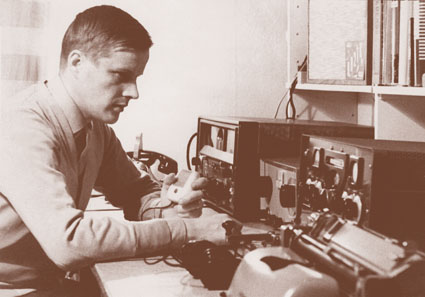Human communication’s easy, right?
After all, we’re all human. We talk to humans every day, even if it’s through a screen. We tweet them, DM them, send them emails, write letters. We’ve been communicating since our dramatic entrance into the world.

We’ve been doing since our descent from the trees and our occupancy of caves that it should be easy.
But it’s not.
Ask Professor Osmo Wiio.
Communication usually fails, except by accident.
That’s his fundamental law of human communication. He formed his laws of human communication in the spirit of Murphy’s Law (to paraphrase, if something can go wrong, it will, and at the most inopportune time). If the best humor is that which reveals a universal truth, Wiio cuts to the bone.
Communication is hard because it’s laced with nuance and relies on context. It’s the reading (or mis-reading) of nuance that gets us into trouble. Nuance arises from individual context. Context shapes our character, how we see reality, and how we interact with others.
Context is problematic because it’s difficult to discern, especially when we’re writing to be read by others. The age-old writing maxim insists on considering your audience. Who are they? What do they need?
This is a strategic guess when we’re writing (this is what makes personal data valuable to marketers). Knowledge is limited and data offers little more. So, we anticipate objections to our arguments and parry before meeting them. This is manageable when we’re colocated with the audience, but the context of conversation is as individual as the parties involved.
For example.
Imagine having a drink (hot or cold, you choose) with a friend and telling a story. You start talking before ordering and, pausing a moment when the server sets the drinks between you.
You’re telling your story. You have an interested audience. Nodding, eye contact, knowing smirks – you’re receiving instant feedback.
It’s your story, so you choose the details, the ones you believe will deliver the story in the way that’s meant to be understood. You want your friend to know how you felt in the interaction you’re describing.
Your friend listens, asks questions, questions that take you down different paths, even into the occasional rabbit hole. Those prompts come from a different set of contexts. The questions are an attempt to resolve the dissonance between the speaker and the audience and drive toward shared meaning. Your friend asks the questions because the experiences that shaped your friend are different than the experiences that shaped you. And even though you’re sharing context in this moment, each individual experience is unique.
We’ve stumbled upon something here: multiple contexts. That’s what makes human communication damn hard.
Conversation is difficult. Writing is harder.
Now, imagine you sit down to write a letter to a friend. What do you know?

Depending on your level of intimacy, you may have an understanding of the experiences that shaped your friend. This is great, because you can use this information to tailor the experience and directly connect with them. But what if you’re not privy to intimate details? What if your knowledge is general, even generic.
Couple the lack intimate knowledge with the fact that your words can be read any place, any time, under any conditions, and you have a recipe for miscommunication that would make Osmo Wiio guffaw in delight.
Because the words can be read at any time, writer and audience don’t share in the experience of the work. To be successful, we need to anticipate a lot of things – objections, questions, fears, doubts – all of which are beyond the control of the writer. The barrier to good communication is high.
Assumptions have a limit. And with limited vocabularies and limited faculties for deploying language, there’s a good chance the point will be missed.
These factors are an existential weight on the writer. Some writers struggle to jot the first word – there are too many unknowns!
Blocked.
Compound that with a limited understanding or thought on the subject we’re writing about, perhaps nothing greater than a notion. The only way to figure out what we think is by doing the work –
Overcoming adversity, grappling with ideas, exposing weaknesses – these are difficult things to do, but all part of the creative act, especially in early drafts. If we listen to our thoughts and experience, we become effective writers. We learn how to communicate. We learn about ourselves. We learn about our audience. We make mistakes. And we find success.
Now, Nick, I hear you saying, this is pishy-caca. We’re talking about business communication, and business communication is not art. It’s transactional. Business professionals do not need to write like Shakespeare. In fact, if we sucked the emotion out altogether, we would all be better off. Business professionals don’t have time to interpret. The world moves too fast.
I’m going to channel Wiio here: some business communication is transactional, but most business communication fails because it’s not wholly transactional.
When you treat it as transactional, you make mistakes like not thinking about tone or providing the right details at the right time or failing to convince your audience of the genius of your ideas.
This challenge isn’t endemic to business. Self-help shelves at the local bookstore are lined with books detailing effective approaches to writing. Or presenting. Or designing – human communication.
And while we would like to believe that cold, Vulcan logic and facts convince in our data-driven world, narrative and human connection reign supreme. Even within a business context.
It’s the fine art of interspersing facts with human details that wins in the end.
My Lament
We gave up trying to master human communication. We like the idea of leaving it to the machines because the machines, we’re told, do it better than we can.
Maybe this attitude is a direct result of the capitalist world (this is not a knock on capitalism) we live in where all interactions are reduced to mere commodities, their perceived value measured in the successful conveyance of goods and services. And we’ve developed a whole host of technologies to support the buying and selling of goods.
There are tradeoffs.
Curiosity, the passionate pursuit of our ideas, the maturation of an inkling from seed to mature thought, all victims of a culture of transactional communication. Abandoning critical thinking in the cultivation of ideas doesn’t accelerate the maturity of ideas or the things we produce. Higher production equals more seeds, but less thought and care goes into each and each is less potent.
As the world’s standard of living has increased, particularly in the Western world, people are sadder and madder than they’ve been.
Don’t outsource to tech what you can do for yourself.
Tools like ChatGPT have their place, and there may be times when they’re useful. I admit that I use spellcheckers and parts-of-speech highlighters and search for well-worn phrases that insidiously creep into my drafts because of their ease of use in everyday conversation. These tools highlight areas that need work. When I see a pattern, I add an element to the process to tune it. The process constantly improves but it will never achieve a perfect outcome. That’s not the point.
I think what I’m bemoaning is the continued loss of richness in human communication. The further we get from our content, our context, and our audience, the more difficult communication becomes. We’ve seen this in the degradation of communication wrought by social media, where interpretation of character-limited phrases wants for clarity.
Some tools, while they allow swift movement, widen the gap between the creator, their work, and the audience. There’s something to be said for grappling with your ideas, structuring them, and engaging in self-discovery. Through the difficulty, they become your thoughts, your ideas, your approaches, and you understand your conclusions. It’s much harder when you outsource the work to someone or something.
The line of thought in this essay is fueled by the sudden appearance of ChatGPT. Nothing in life is as sudden as it seems. But, it represents rapid movement – and the existential anxiety that comes with change – rapid movement away from better human communication toward a world in which we speak through interfaces instead of representing our own ideas in our own language.
Language, like music, is a beautiful nuanced mechanism of communication. To master it requires examination, experimentation, and practice. Mastery does not equal perfection. Mastery is the ability to understand, interpret, and add nuance to the communications we create.
But who has time for that? Being human is hard enough.
But it’s okay to do hard things.
